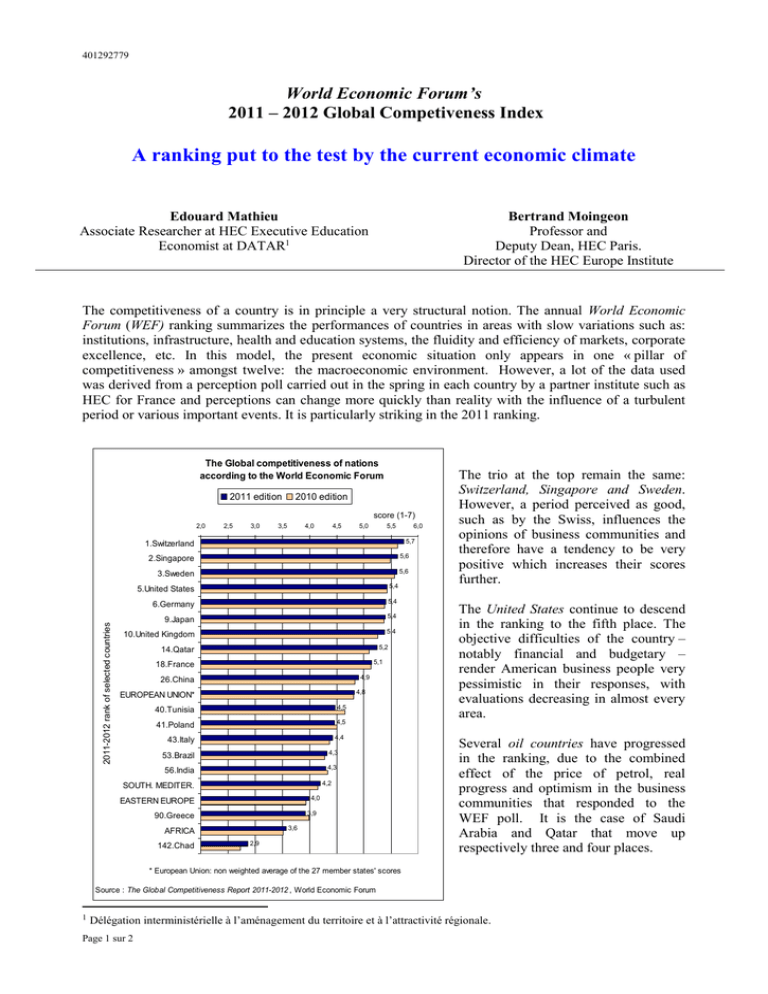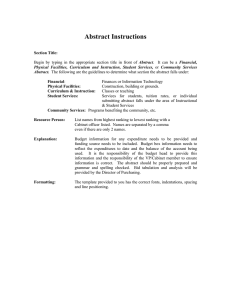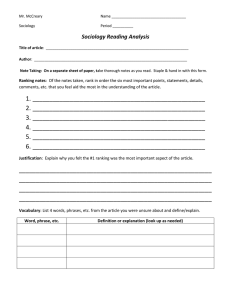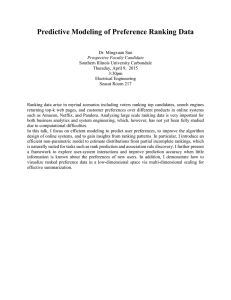Report of World Economic Forum's 2011-2012 Global Competiveness Index
advertisement

401292779 World Economic Forum’s 2011 – 2012 Global Competiveness Index A ranking put to the test by the current economic climate Edouard Mathieu Associate Researcher at HEC Executive Education Economist at DATAR1 Bertrand Moingeon Professor and Deputy Dean, HEC Paris. Director of the HEC Europe Institute The competitiveness of a country is in principle a very structural notion. The annual World Economic Forum (WEF) ranking summarizes the performances of countries in areas with slow variations such as: institutions, infrastructure, health and education systems, the fluidity and efficiency of markets, corporate excellence, etc. In this model, the present economic situation only appears in one « pillar of competitiveness » amongst twelve: the macroeconomic environment. However, a lot of the data used was derived from a perception poll carried out in the spring in each country by a partner institute such as HEC for France and perceptions can change more quickly than reality with the influence of a turbulent period or various important events. It is particularly striking in the 2011 ranking. The Global competitiveness of nations according to the World Economic Forum 2011 edition 2010 edition score (1-7) 2,0 2,5 3,0 3,5 4,0 4,5 5,0 5,5 6,0 5,7 1.Switzerland 5,6 2.Singapore 5,6 2011-2012 rank of selected countries 3.Sweden 5.United States 5,4 6.Germany 5,4 9.Japan 5,4 5,4 10.United Kingdom 5,2 14.Qatar 5,1 18.France 4,9 26.China 4,8 EUROPEAN UNION* 4,5 40.Tunisia 41.Poland 4,5 43.Italy 4,4 4,3 53.Brazil 4,3 56.India 4,2 SOUTH. MEDITER. 4,0 EASTERN EUROPE 3,9 90.Greece 3,6 AFRICA 142.Chad 2,9 The trio at the top remain the same: Switzerland, Singapore and Sweden. However, a period perceived as good, such as by the Swiss, influences the opinions of business communities and therefore have a tendency to be very positive which increases their scores further. The United States continue to descend in the ranking to the fifth place. The objective difficulties of the country – notably financial and budgetary – render American business people very pessimistic in their responses, with evaluations decreasing in almost every area. Several oil countries have progressed in the ranking, due to the combined effect of the price of petrol, real progress and optimism in the business communities that responded to the WEF poll. It is the case of Saudi Arabia and Qatar that move up respectively three and four places. * European Union: non weighted average of the 27 member states' scores Source : The Global Competitiveness Report 2011-2012 , World Economic Forum 1 Délégation interministérielle à l’aménagement du territoire et à l’attractivité régionale. Page 1 sur 2 401292779 The « Arab Spring » was only just beginning when the survey was being carried out. If the long-term consequences turn out to be positive, they will immediately translate into a backward step by the countries concerned by the ranking. The intrinsic uncertainties of events such as these and a more critical eye explain, for example, that Tunisia has moved from the 32nd to the 40th place. Amongst the emerging countries, China and Brazil continue to progress. China is now 27th, which puts it ahead of the European Union average. The European Union shows very dispersed results, with six members in the top 10, whereas Greece continues to descend the ranking to the 90th place. The importance of France and Germany in the Euro zone and the improved German macroeconomic performance, have given rise to several comparative studies2. Benchmarking France and Germany versus the leading country in each field of competitiveness (1-to-7 scale) France Germany Leading country 1.Institutions (Singapore) 7 12.Innovation (Sw itzerland) 6 2.Infrastructure (Hong Kong) 5 11.Business sophistication (Japan) 4 3 3.Macroeconomic stability (Brunei) 2 1 10.Market size (USA) 0 9.Technological readiness (Sw itzerland) 4.Health and primary education (Finland) 5.Higher education and training (Finland) 8.Financial market development (Singapore) 6.Goods market efficiency (Singapore) 7.Labor market efficiency (Sw itzerland) Source: World Economic Forum, The Global Competitiveness Report 2011-2012 The WEF analyses underline similarities between the two economies (see graph). Moreover their scores are generally stable between 2010 and 2011 even if Germany loses a place and France three places in the ranking. Thus the two countries are at the top of the ranking concerning infrastructures (with scores not very different from the world leader, Hong Kong), health and primary education (leader: Finland), but it finds itself at the back of the pack – for different reasons – concerning labour market efficiency (leader: Switzerland). Their performances are also close in terms of real estate market efficiency (leader: Singapore), technological agility including information and communication technology (leader: Switzerland), institutions (leader: Singapore) and size of market (leader: United States). But, France is lagging compared to Germany not only in macroeconomic performance (leader: Brunei), but also, to a lesser extent, in higher education, innovation and business sophistication (leaders: Finland, Switzerland and Japan). 2 See for example the report: Mettre un terme à la divergence de compétitivité entre la France et l'Allemagne, COEREXECODE, dir. Michel Didier, January 2011. The information in the WEF survey, more detailed than what we were able to report here, converge generally with the observations of COE-REXECODE. Page 2 sur 2


